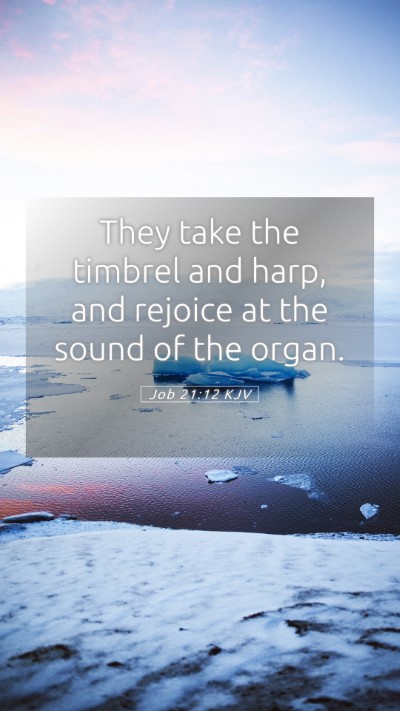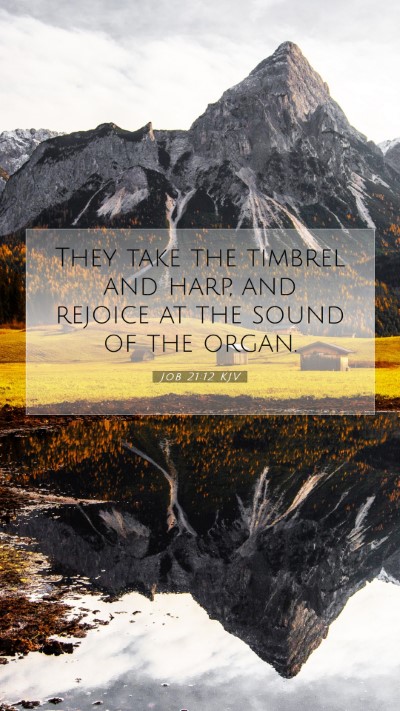Bible Verse Meaning and Commentary for Job 21:12
Job 21:12 states, "They take the timbrel and harp, and rejoice at the sound of the organ." This verse is part of Job's response to his friends, highlighting the contrast between the life of the wicked and the suffering he endures. Below, we provide a comprehensive analysis of this verse, drawing insights from notable public domain commentaries including those by Matthew Henry, Albert Barnes, and Adam Clarke.
Understanding Job 21:12
The main focus of this verse revolves around the theme of joy and the celebrations that individuals, particularly the wicked, engage in regardless of their moral standing. Job points out that despite the righteous suffering, those who are immoral often display joy and merriment, represented here by musical instruments which symbolize happiness and carefree living.
Commentary Highlights
-
Matthew Henry:
Henry emphasizes the absurdity of the wicked's carefree attitude, suggesting that their temporary joy does not account for their impending judgment. He highlights how this enjoyment leads to a false perception of stability and well-being, which can mislead onlookers into thinking that prosperity is an indicator of righteousness.
-
Albert Barnes:
Barnes underscores the irony present in this verse, noting that while the wicked may indulge in music and celebration, it does not reflect true happiness since they are living lives that are contrary to divine law. He points out that Job is illustrating a point about the transient nature of joy when disconnected from moral integrity.
-
Adam Clarke:
Clarke elaborates on the instruments mentioned, indicating that they represent the pleasures and entertainments that the wicked often partake in. He critiques this joy as superficial, serving only to mask the underlying reality of their sinfulness, and he poses the question of true happiness linked to spiritual well-being instead of materialistic or hedonistic pursuits.
Significance of Job 21:12
This verse serves to challenge prevailing notions about prosperity and suffering. It invites readers to reflect on the realities of life — that joy can exist apart from righteousness, but such joy is fleeting and ultimately unsustainable in the face of divine justice.
Application of Job 21:12
Job 21:12 is relevant today, as it encourages individuals to seek deeper understanding and meaning in their own lives rather than simply pursuing happiness through worldly pleasures. This verse can prompt discussions in bible study groups about the nature of true joy and fulfillment. It serves as a valuable Bible study guide for examining the contrasts between perceived happiness and true spiritual contentment.
Related Bible Cross References
- Psalm 73:3-5: Acknowledges the prosperity of the wicked.
- Ecclesiastes 8:14: Reflects on the seeming ease of the wicked’s life.
- James 5:5: Exposes the fleeting pleasures of those who live in indulgence.
Conclusion
Job 21:12 deeply explores the concept of joy in the context of moral standing. Through careful scripture analysis, readers can derive significant bible study insights which compel them to investigate the foundations of true happiness and the repercussions of a life detached from ethical considerations. Understanding Scriptural passages like Job 21:12 offers critical insights for believers seeking to interpret Bible verses meaningfully and apply them to their daily lives.
Overall, this verse challenges us to think critically about the essence of joy and invites reflection on our own lives in the context of divine justice and righteousness.


